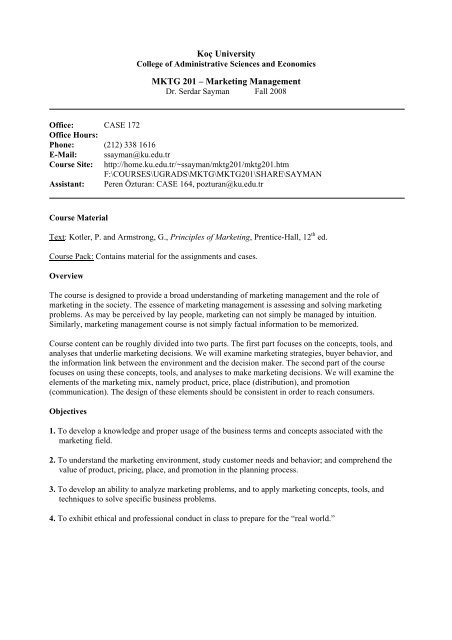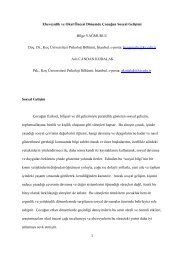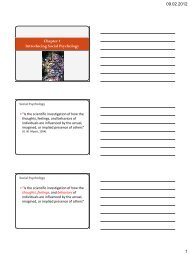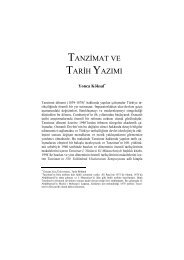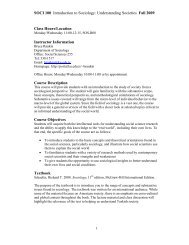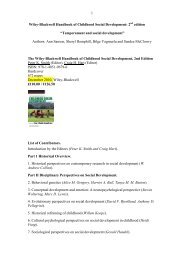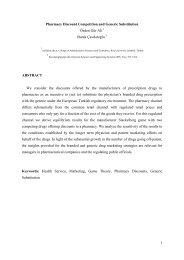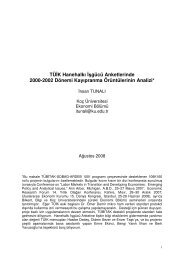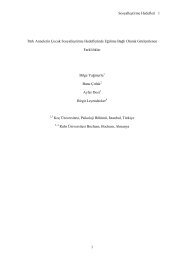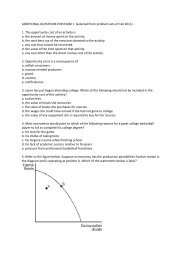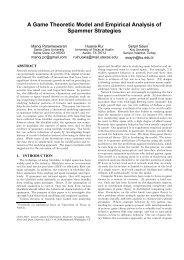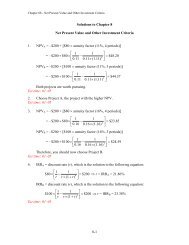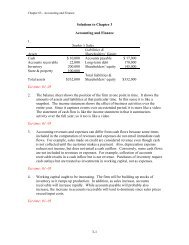Koç University MKTG 201 – Marketing Management - KUAIS - Koç ...
Koç University MKTG 201 – Marketing Management - KUAIS - Koç ...
Koç University MKTG 201 – Marketing Management - KUAIS - Koç ...
You also want an ePaper? Increase the reach of your titles
YUMPU automatically turns print PDFs into web optimized ePapers that Google loves.
<strong>Koç</strong> <strong>University</strong><br />
College of Administrative Sciences and Economics<br />
<strong>MKTG</strong> <strong>201</strong> <strong>–</strong> <strong>Marketing</strong> <strong>Management</strong><br />
Dr. Serdar Sayman Fall 2008<br />
Office: CASE 172<br />
Office Hours:<br />
Phone: (212) 338 1616<br />
E-Mail: ssayman@ku.edu.tr<br />
Course Site: http://home.ku.edu.tr/~ssayman/mktg<strong>201</strong>/mktg<strong>201</strong>.htm<br />
F:\COURSES\UGRADS\<strong>MKTG</strong>\<strong>MKTG</strong><strong>201</strong>\SHARE\SAYMAN<br />
Assistant: Peren Özturan: CASE 164, pozturan@ku.edu.tr<br />
Course Material<br />
Text: Kotler, P. and Armstrong, G., Principles of <strong>Marketing</strong>, Prentice-Hall, 12 th ed.<br />
Course Pack: Contains material for the assignments and cases.<br />
Overview<br />
The course is designed to provide a broad understanding of marketing management and the role of<br />
marketing in the society. The essence of marketing management is assessing and solving marketing<br />
problems. As may be perceived by lay people, marketing can not simply be managed by intuition.<br />
Similarly, marketing management course is not simply factual information to be memorized.<br />
Course content can be roughly divided into two parts. The first part focuses on the concepts, tools, and<br />
analyses that underlie marketing decisions. We will examine marketing strategies, buyer behavior, and<br />
the information link between the environment and the decision maker. The second part of the course<br />
focuses on using these concepts, tools, and analyses to make marketing decisions. We will examine the<br />
elements of the marketing mix, namely product, price, place (distribution), and promotion<br />
(communication). The design of these elements should be consistent in order to reach consumers.<br />
Objectives<br />
1. To develop a knowledge and proper usage of the business terms and concepts associated with the<br />
marketing field.<br />
2. To understand the marketing environment, study customer needs and behavior; and comprehend the<br />
value of product, pricing, place, and promotion in the planning process.<br />
3. To develop an ability to analyze marketing problems, and to apply marketing concepts, tools, and<br />
techniques to solve specific business problems.<br />
4. To exhibit ethical and professional conduct in class to prepare for the “real world.”
Teaching Method and Participation<br />
The course will consist of lectures and case discussions. You are responsible for everything discussed or<br />
presented in the class. We will not talk about each and every page in the textbook.<br />
Students are expected to attend all classes; according to the new regulation of the <strong>Koç</strong> <strong>University</strong> Board<br />
of Trustees, any student missing 10 classes will automatically receive an F grade. I would expect that you<br />
are inside the classroom, seated and ready to start the class on its scheduled start-time. If you arrive after<br />
the start of classes on more than a couple of occasions, you can expect your class participation grade to<br />
be reduced by half.<br />
You are also expected to participate in class discussions <strong>–</strong> both for lectures and case sessions. In doing<br />
so, you are expected to use the proper marketing terms and concepts in the classroom. Sharing your<br />
ideas, comments, or experiences with other members of the class will enhance the learning process. Try<br />
to pay attention to the world of marketing throughout the semester; you will see things on TV, print<br />
media, Internet, in stores etc. that are relevant to the course material. Try to apply what you learn in the<br />
class to what you observe. You are encouraged to incorporate your observations, thoughts into class<br />
discussion.<br />
Experience suggests that marketing is best learned through study and application in a cumulative manner;<br />
the value of the course is greatly diminished if students attempt to substitute pre-exam cramming for<br />
regular preparation. In order to get most out of this course while spending the least time is reading the<br />
material in advance. I recommend you to reserve and plan a time slot every week to read the material.<br />
Course Components and Grading<br />
Your final course grade will be based on the following criteria and weights:<br />
• midterm exams 1 & 2 40%<br />
• final exam 25%<br />
• individual assignments 1 & 2 10%<br />
• group case assignments 1 & 2 15%<br />
• class participation 10%<br />
………………………………………………………<br />
• research participation (bonus) 2%<br />
Midterm and Final Exams All exams will be closed book, in-class exams. They will be noncumulative,<br />
and will include both multiple choice and essay type questions drawn from the text and class<br />
discussions. In case the student misses an exam, the instructor reserves the right of not accepting the<br />
medical report or any other excuse, and thus not giving a make-up exam. All make-ups will be given<br />
during the scheduled period after the final exams.<br />
Individual Assignments. There are 2 individually prepared assignments throughout the semester. All<br />
assignments should be edited carefully and typewritten. Before handing in your assignments read them<br />
once again, check for spelling and grammatical errors, and the general structure of the work. All<br />
assignments are due beginning of the class as will be specified. Late work will not be accepted.<br />
Individual assignment means that you are required to do the work on your own without collaboration<br />
with anyone else.<br />
Group Case Assignments. There are 2 case studies; they are intended to give you experience in<br />
analyzing a problem, and making and supporting a decision. Students will form groups of size 4 at the<br />
beginning of the semester. Any student who does not join a group until February 18 will be assigned to<br />
one by the instructor. Each group will submit one typewritten report. Reports are typically around 3, 4<br />
pages (assuming double spaced lines and a 12 point font). If needed, you can provide exhibits or<br />
calculations in an additional appendix. A suggested format for the case report is as follows - course<br />
website includes a guide for case analysis and writing a case report:
- Introduction / Statement of the Problem<br />
- Situation Analysis<br />
- Evaluations of Alternatives<br />
- Recommendations<br />
- Appendix / Exhibits (if needed)<br />
It is essential that group members participate in the process, rather than assigning individuals to data<br />
analysis, report writing etc. Hence, each student should be prepared for class discussion of the case.<br />
Please be patient to discuss your recommendations with other groups; do not share your ideas about the<br />
cases before class discussion.<br />
Class participation. Although evaluating class participation and preparation is inherently subjective,<br />
there are some criteria upon which an objective assessment may be built. Some of them are:<br />
• Do comments show an apprehension of the issues and concepts presented in the course?<br />
• Is the participant a good listener, are the points relevant to the discussion, are they linked to the<br />
comments of others?<br />
• Is the participant prepared, does s/he merely repeat the facts or go beyond that?<br />
It is important to understand that frequency of participation is different than the quality of participation.<br />
That is, you should try to make effective use of discussion time in class, through thoughtful, timely, and<br />
constructive participation.<br />
Research Participation Bonus (when available). In order to conduct academic research, it is very<br />
important for marketing academics to have people voluntarily complete surveys and studies. This<br />
experience will also help you gain a better understanding of what marketing research is about. If such an<br />
opportunity for participating in a research study and earning an extra 2% as a bonus to your course grade<br />
is available this semester, details will be provided to you later.<br />
Course Policies<br />
There are role expectations in the world of business as well as academia. Among these role expectations<br />
is that people will comport themselves in a “professional” manner. This expectation includes<br />
(i) treating one another with respect<br />
(ii) timely attendance at all class meetings<br />
(iii) the appearance of involvement, including being attentive; being responsive; not being involved in<br />
activities unrelated to the course<br />
(iv) sharing your views with the class and instructor, but not with a small group<br />
<strong>University</strong> rules and policies on academic honesty will be strictly enforced. Cheating, plagiarism,<br />
collusion or any other form of dishonesty will not be tolerated. I expect all assignments to be completed<br />
without examining others’ work. Students and faculty adhere to the following principles of academic<br />
honesty at <strong>Koç</strong> <strong>University</strong>:<br />
1. Individual accountability for all individual work, written or oral. Copying from others or providing<br />
answers or information, written or oral, to others is cheating.<br />
2. Providing proper acknowledgment of the original author. Copying from other student’s paper or from<br />
another text without written acknowledgement is plagiarism.<br />
3. Group activity is authorized teamwork but only for group projects or cases. Unauthorized help from<br />
another person or having someone else write one’s paper or assignment is collusion.
Tentative Course Outline<br />
Course Introduction and Overview - Ch.1 & Syllabus<br />
<strong>Marketing</strong> Strategy - Ch.2 & App. 1<br />
Creating Competitive Advantage - Ch.18<br />
Basic Quantitative Analysis in <strong>Marketing</strong> - App. 2<br />
Individual Assignment 1 <br />
Consumer Buyer Behavior - Ch.5<br />
Business Buyer Behavior - Ch.6<br />
<strong>Marketing</strong> Information - Ch.4<br />
Midterm 1<br />
Segmentation, Targeting, and Positioning - Ch.7<br />
Product Strategy - Ch.8<br />
Pricing - Ch.10 & 11<br />
Group Case Assignment 1 <br />
<strong>Marketing</strong> Channels - Ch.12<br />
Retailing and Wholesaling - Ch.13<br />
Midterm 2<br />
<strong>Marketing</strong> Communications, Advertising, Sales Promotion… - Ch.14, 15, 16<br />
Individual Assignment 2 <br />
New Product Development - Ch.9<br />
Online and Direct <strong>Marketing</strong> - Ch.17<br />
The <strong>Marketing</strong> Environment - Ch.3<br />
Global Marketplace - Ch.19<br />
Group Case Assignment 2 <br />
Final Exam


